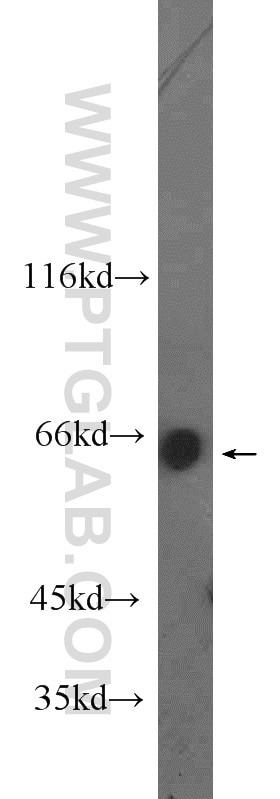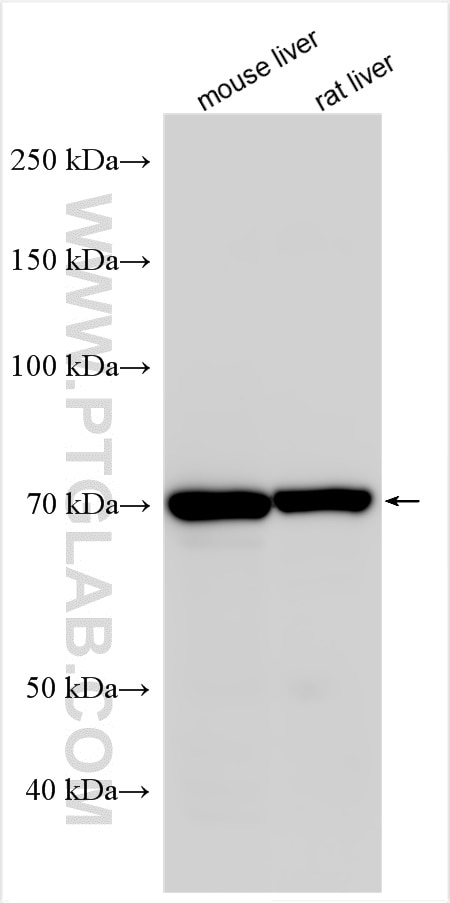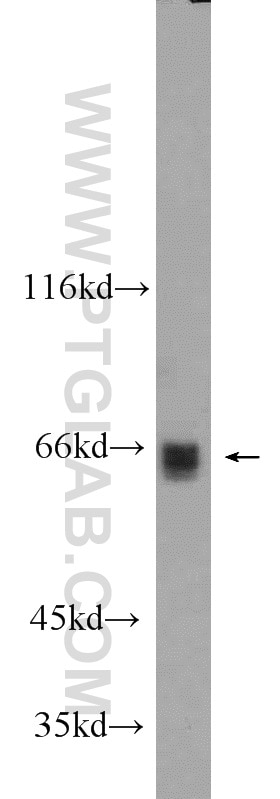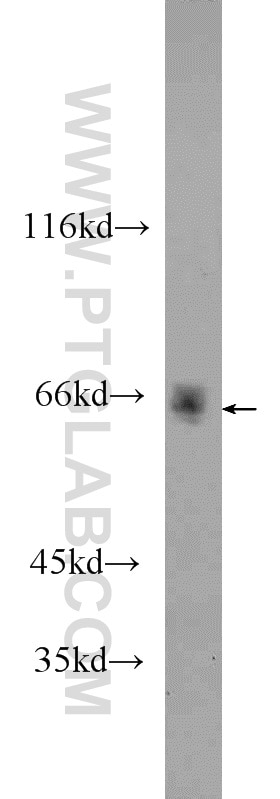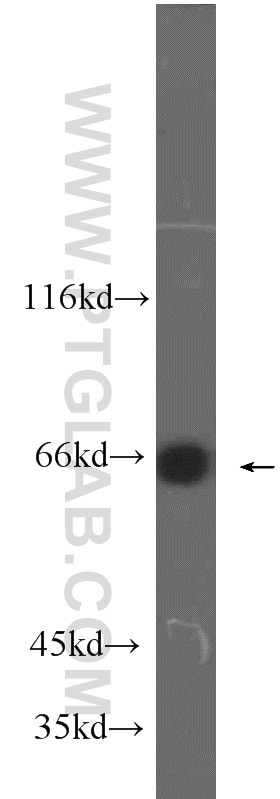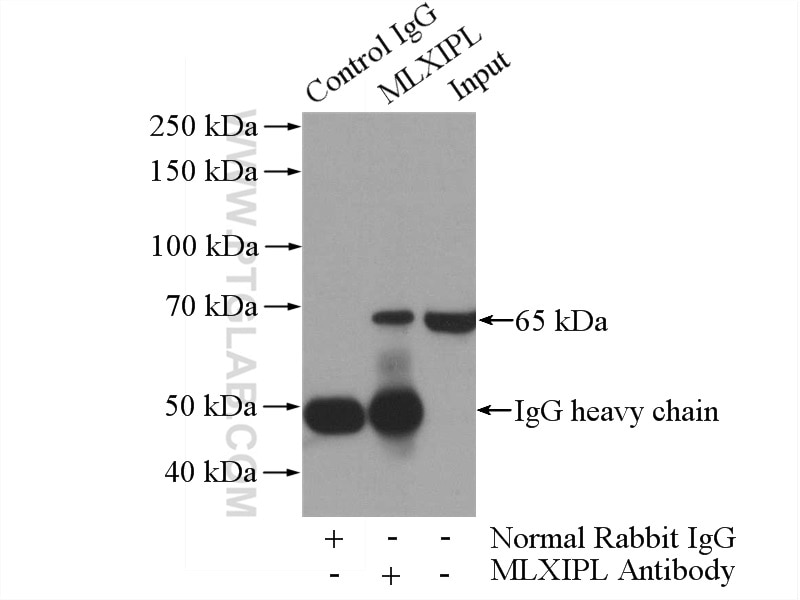Anticorps Polyclonal de lapin anti-MLXIPL
MLXIPL Polyclonal Antibody for WB, IP, ELISA
Hôte / Isotype
Lapin / IgG
Réactivité testée
Humain, rat, souris
Applications
WB, IHC, IF, IP, ELISA
Conjugaison
Non conjugué
N° de cat : 13256-1-AP
Synonymes
Galerie de données de validation
Applications testées
| Résultats positifs en WB | tissu hépatique de souris, cellules HeLa, cellules HepG2, tissu hépatique de rat, tissu hépatique humain |
| Résultats positifs en IP | cellules HepG2 |
Dilution recommandée
| Application | Dilution |
|---|---|
| Western Blot (WB) | WB : 1:500-1:1000 |
| Immunoprécipitation (IP) | IP : 0.5-4.0 ug for 1.0-3.0 mg of total protein lysate |
| It is recommended that this reagent should be titrated in each testing system to obtain optimal results. | |
| Sample-dependent, check data in validation data gallery | |
Applications publiées
| WB | See 16 publications below |
| IHC | See 1 publications below |
| IF | See 4 publications below |
Informations sur le produit
13256-1-AP cible MLXIPL dans les applications de WB, IHC, IF, IP, ELISA et montre une réactivité avec des échantillons Humain, rat, souris
| Réactivité | Humain, rat, souris |
| Réactivité citée | Humain, souris |
| Hôte / Isotype | Lapin / IgG |
| Clonalité | Polyclonal |
| Type | Anticorps |
| Immunogène | MLXIPL Protéine recombinante Ag3481 |
| Nom complet | MLX interacting protein-like |
| Masse moléculaire calculée | 852 aa, 93 kDa |
| Poids moléculaire observé | 65 kDa |
| Numéro d’acquisition GenBank | BC012925 |
| Symbole du gène | MLXIPL |
| Identification du gène (NCBI) | 51085 |
| Conjugaison | Non conjugué |
| Forme | Liquide |
| Méthode de purification | Purification par affinité contre l'antigène |
| Tampon de stockage | PBS with 0.02% sodium azide and 50% glycerol |
| Conditions de stockage | Stocker à -20°C. Stable pendant un an après l'expédition. L'aliquotage n'est pas nécessaire pour le stockage à -20oC Les 20ul contiennent 0,1% de BSA. |
Informations générales
Carbohydrate response element-binding protein (ChREBP), also known as MLXIPL, is a glucose-responsive transcription factor that has a fundamental role in the glucose-mediated induction of genes involved in hepatic glycolysis and lipogenesis. Circulating blood glucose levels affect ChREBP activity in hepatocytes largely by post-translational mechanisms that include phosphorylation-dependent subcellular localization [PMID:21665952]. It enhances expression of the liver pyruvate kinase (LPK) gene and all lipogenic enzyme genes resulting in the conversion of excess dietary carbohydrate into triglycerides that can be stored as fat [PMID:15118080]. Molecular Weight of ChREBP splice variants: 62/78/91/93 kDa.
Protocole
| Product Specific Protocols | |
|---|---|
| WB protocol for MLXIPL antibody 13256-1-AP | Download protocol |
| IP protocol for MLXIPL antibody 13256-1-AP | Download protocol |
| Standard Protocols | |
|---|---|
| Click here to view our Standard Protocols |
Publications
| Species | Application | Title |
|---|---|---|
EMBO Rep Lin28 enhances de novo fatty acid synthesis to promote cancer progression via SREBP-1. | ||
Clin Transl Med Phosphoproteome reveals molecular mechanisms of aberrant rhythm in neurotransmitter-mediated islet hormone secretion in diabetic mice. | ||
Front Pharmacol Roxadustat, a Hypoxia-Inducible Factor 1α Activator, Attenuates Both Long- and Short-Term Alcohol-Induced Alcoholic Liver Disease. | ||
J Agric Food Chem Diosmetin Ameliorates Nonalcoholic Steatohepatitis through Modulating Lipogenesis and Inflammatory Response in a STAT1/CXCL10-Dependent Manner. | ||
J Agric Food Chem Baicalein Enhances the Effect of Acarbose on the Improvement of Nonalcoholic Fatty Liver Disease Associated with Prediabetes via the Inhibition of De Novo Lipogenesis. | ||
Food Funct Polysaccharide MCP extracted from Morchella esculenta reduces atherosclerosis in LDLR-deficient mice. |
